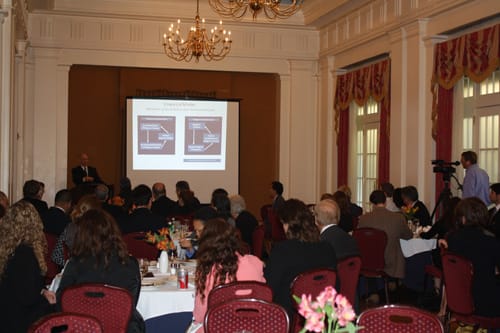RFIA Presents Allen Hertzke Lecture: “International Religious Freedom Advocacy: Peril and Promise”

Arlington, VA (October 26, 2012) On 23 October 2012, The Review of Faith & International Affairs sponsored “International Religious Freedom Advocacy: Peril and Promise,” a lecture by Allen Hertzke, acclaimed author and internationally recognized expert on religion and politics. Dr. Hertke’s lecture presented findings and recommendations derived from a special issue of The Review that he guest-edited on “Strategies of Advocacy for International Religious Freedom.” A lively period of q-and-a with the diverse and distinguished audience followed the lecture. Video of the lecture and q-and-a are available here.
The lecture was held at the Army-Navy Club (one from the White House), a venue that both substantively and symbolically underscores that the role of religion in public life is not just a matter of “soft power” but is also inextricably related to hard power; for good or ill, religion and realpolitik are always interrelated. By design, this invitation-only event brought governmental and grassroots leaders together. To borrow from the lingo of diplomacy, the event represented a creative intersection of “Track 1” and “Track 2” – i.e. “Track 1.5” engagement. Over sixty U.S. government personnel, academics, religious leaders, and civil society members attended.
At the event Dr. Hertzke also presented a new model syllabus on international religious freedom advocacy, which he co-authored with Thomas Farr, Jason Pudlo, and Dennis Hoover. This syllabus outlines the philosophical, religious, and political underpinnings of religious freedom, surveys the constituent components of its application in the contemporary world, and explores strategies to advance it in diverse settings. The outline can be used as the basis of a freestanding course, while the separate modules may be integrated as needed into other related classes. Click here to download a copy.
The special issue of The Review, Dr.Hertzke’s lecture, and the model syllabus are part of an ongoing series funded in part through the support of a grant from the John Templeton Foundation. The views expressed are those of the authors/speakers and do not necessarily reflect the views of the Templeton Foundation.